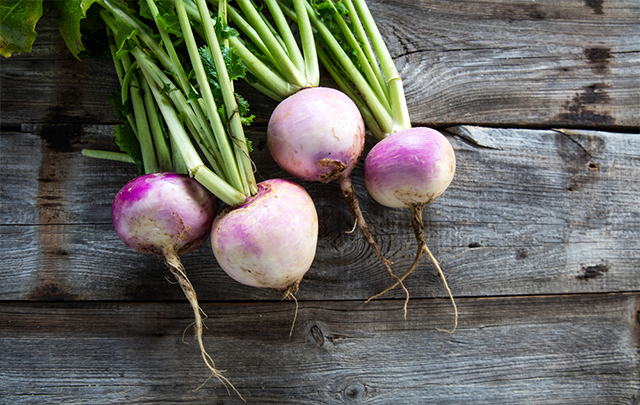6 Reasons to eat more turnip greens, a lesser known nutritional powerhouse
07/30/2020 / By Virgilio Marin

Turnip greens are cruciferous vegetables that belong to the same family as kale and broccoli. Turnip greens refer to the dark leafy green tops of turnips which are often discarded. However, they are completely edible and, in fact, are among the healthiest vegetables you can eat.
In terms of the Aggregate Nutrient Density Index (ANDI), which is a measure of the vitamin, mineral and phytonutrient density of foods relative to their calorie content, turnip greens are among the highest-ranking foods, together with some of other cruciferous vegetables. This means that turnip greens are packed with powerful nutrients but are low in calories.
A one-cup serving (55 grams) of raw turnip greens provides the following:
- 33 milligrams (mg) of vitamin C
- 105 micrograms (mcg) of folate
- 318 mcg of vitamin A
- 138 mcg of vitamin K
According to experts, adult men should consume 120 mcg of vitamin K daily, while women should consume 90 mcg. Adult men should also get 900 mcg of vitamin A from their diet, while women should get 700 mcg daily. A one-cup serving of turnip greens provides more than the recommended daily intake (RDI) of vitamin K and one-third of the RDI of vitamin A.
6 Health benefits of turnip greens
Turnip greens offer several health benefits. Here are six of the most notable ones:
1. Reduce the risk of anemia
Anemia is a condition in which a person doesn’t have enough red blood cells to carry oxygen to organs and tissues. One of its leading causes is iron deficiency.
Turnip greens are rich in iron and vitamin C. The combination of these two nutrients can help the body absorb iron better, decreasing the risk of anemia.
2. Protect against cancer
Cruciferous vegetables like turnip greens are rich in anti-cancer compounds. Sulforaphane, for example, offers protection against cancer. This compound is responsible for the bitter taste of cruciferous vegetables. Research shows that sulforaphane inhibits the enzyme histone deacetylase, which is known to play a role in cancer progression.
Vitamin C also has anti-cancer effects. As an antioxidant, vitamin C fights free radicals that can trigger the development of cancer. Chlorophyll in turnip greens can also offset the carcinogenic effects of grilled or burnt foods.
3. Improve digestion
Turnip greens are rich in fiber and have a high water content, so eating them can help prevent constipation, improve digestion and promote good gut health.
4. Prevent osteoporosis
Osteoporosis is characterized by brittle and weak bones. This may be caused by poor calcium and vitamin K intake, which studies have linked to a higher risk of bone fracture.
To prevent osteoporosis and keep your bones strong and healthy, eat plenty of turnip greens, which are rich in calcium and vitamin K.
Turnip greens also contain vitamin A, phosphorus and magnesium, which are all beneficial for bone health.
5. Improve sleep and mood
Choline in turnip greens can help improve sleep, muscle movement, learning and memory. It also aids in maintaining the structure of cellular membranes and in transmitting nerve impulses.
Folate, on the other hand, helps with depression by preventing excess homocysteine from forming in the body. Research shows that excess homocysteine can interfere with the production of serotonin, dopamine and norepinephrine. These feel-good hormones regulate mood, sleep and appetite.
6. Boost skin and hair health
Turnip greens also benefit the skin and hair because they are rich in vitamins A and C.
Vitamin A plays an important role in the growth of body tissues, including the skin. It is also good for hair health given its part in sebum production. Sebum keeps the hair moisturized.
Meanwhile, vitamin C is involved in collagen production. Collagen is a protein that provides structure to skin and hair. (Related: The best way to gain all the health benefits of turnip greens is to steam them.)
Iron deficiency is also linked to hair loss, but this can be easily prevented by eating turnip greens, which are a great source of iron.
Turnip greens are nutritious veggies that will make great additions to a healthy diet. The many benefits they provide also make these leafy greens a bona fide superfood. To prevent conditions like anemia, osteoporosis and cancer, incorporate turnip greens into a well-balanced diet and combine it with regular exercise and a healthy lifestyle.
Learn more about cruciferous vegetables like turnip greens at Veggie.news.
Sources include:
Tagged Under: anemia, beatdepression, bone health, digestion, food cures, food is medicine, functional food, hair health, mental health, natural medicine, nutrients, osteoporosis, skin health, sleep, turnip greens, veggie
RECENT NEWS & ARTICLES
COPYRIGHT © 2017 NUTRIENTS NEWS




















